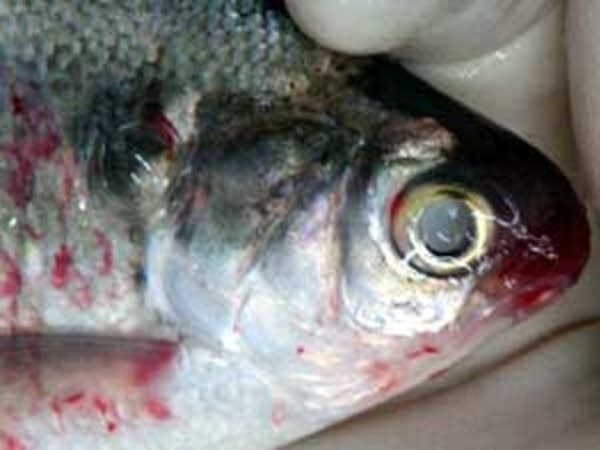Deadly fish virus reaches Lake Superior
Go Deeper.
Create an account or log in to save stories.
Like this?
Thanks for liking this story! We have added it to a list of your favorite stories.

Researchers have identified the deadly fish disease, known as VHS, in fish taken from four places in Lake Superior.
Researchers have been watching Lake Superior since at least 2007 for signs of viral hemorrhagic septicemia - a disease believed associated with salt water fish that's been quickly moving through the fresh water Great Lakes. VHS is blamed for some large-scale fish kills that have covered beaches with wind-rows of rotting dead fish.
Now, researchers with Cornell University have confirmed VHS in fish from Lake Superior.
Wisconsin DNR Fisheries Director Mike Staggs said he's not surprised. VHS had already killed fish in Lakes Huron and Michigan, the two closest to Superior.
Turn Up Your Support
MPR News helps you turn down the noise and build shared understanding. Turn up your support for this public resource and keep trusted journalism accessible to all.
"I think it's disappointing," Staggs said. "I think everyone has hoped that perhaps it wouldn't move fast or something would intervene. I think it's disappointing but not surprising."
VHS turned up in Wisconsin waters in 2007 in Lake Michigan at Green Bay, and in an inland lake, Lake Winnebago. But Staggs said those outbreaks were short of catastrophic.
"In Lake Winnebago we had a modest fish kill of fresh water drum associated with it," he said. "In Lake Michigan we actually had a fish kill of an exotic species called gobies that was associated with it. We've not seen the big fish kills yet here in Wisconsin that they saw out in Lake Erie and the St. Lawrence River."

Outbreaks in the eastern Great Lakes killed thousands of fish from round gobies to drum to walleye. In fact, dozens of fish species are either known susceptible to the disease or known to carry it. So far, Cornell researchers say there's no evidence the virus kills Asian carp, another exotic species threatening the great lakes.
Minnesota and Wisconsin have been enforcing restrictions on things like bait movement in hopes of keeping VHS out of Lake Superior, as well as from additional inland waters.
But some people say the two states have moved much too slowly to stop VHS.
"Confirming it is disappointing. It's another indication of our inability as a nation to really be effective against very destructive invaders," said Dave Zentner of Duluth, the National President of the environmental group, the Izaak Walton League. "We have such a complex interface, and so little urgency form our regulatory sectors, in my opinion, that we've just let years and years and years go by."
The Izaak Walton League is now working on a project to convince anglers to essentially sterilize boats and equipment coming off Lake Superior. The organization has pushed for much stronger ballast regulations, but with modest success so far.
"This is a biological version of terrorism, in some ways."
"This is urgent stuff," Zentner said. "[I] hate to be too inflammatory, but this is a biological version of terrorism, in some ways."
State regulators are showing no signs of being terrorized. They indicate no sudden change in course with the discovery of VHS. Mike Staggs in Wisconsin said rules there already assumed VHS would be in Lake Superior.
In Minnesota, Dirk Peterson, acting chief of fisheries, said the agency will wait for further tests confirming the virus is really in Lake Superior. But even then, he said regulations are unlikely to change, since practices now in place to stop the movement of invasive fish species would be the same to stop movement of VHS.
But Cornell University researcher Dr. Paul Bowser said he has no doubt about the reliability of the findings. The test used is new in fish studies but widely used in human and veterinary medicine, and he said the test is extremely capable. In addition, a different test in a second lab confirmed the results.
What's not clear is what VHS will mean to Lake Superior fish. Bowser said there are indications unusually warm weather might make fish more vulnerable to the virus.
"In 2006 and 2007, we had some very serious mortality events," Bowser said. "2006 and 2007 had very hot springs."
But that wasn't the case in 2008 and 2009, and he said, there were no major outbreaks in those years.
"What kind of stressor may or may not come together in Lake Superior and whether you'd have mortality events, or whether you would have serious mortality events, right now I would have to say is an unknown," he said.
But there's much to be learned about a disease that's only been present in the Great Lakes area for four years now.



